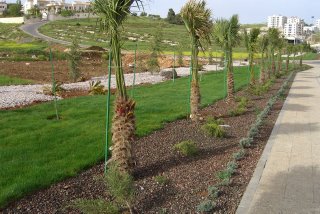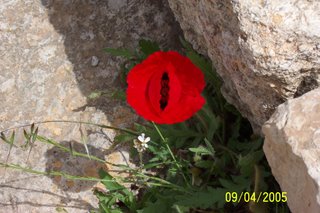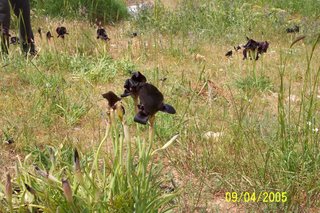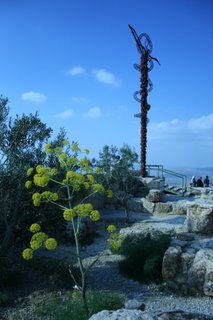While we are on the subject of spring – let's spare a thought for our environment – as Jordan's vistas, the lay of the land and the dwindling green belt and park areas are hijacked by short sighted town planners and turned into questionable commercial ventures. And the price we pay is the loss of vegetation, wild plants and herbs, mother nature's medicine cabinet and most ancient and enduring gift to mankind. Here is an overview:
Knowledge of plants’ healing powers has been handed down over thousands of years of recorded history and by that great oral tradition, the word of mouth. Our ancestors – the hunter gatherers of prehistoric times knew exactly what they were doing: Back in 1960, in a cave in Northern Iraq, archaeologists uncovered the burial site of a Neanderthal man dating back 60,000 years. What was unique about this site was the physical evidence of the use of herbal remedies. After analysis of the soil around the bones, extraordinary quantities of plant pollen were revealed. Some of these plants, such as yarrow (achillea millefolium), are medicinal plants still used throughout the world today.
We have ancient cultures to thank for much of 20th century pharmacopoeia that was derived from the herbal lore of native peoples throughout Asia, Africa, the Americas and Australasia. One of the first recorded "herbal guides" dating back five thousand years, came from the Middle East. Created by the Sumerians of Mesopotamia, present day Iraq, cuneiform clay tablets record the use of 250 herbs for healing such as caraway, thyme and garlic. The Babylonians (c. 1800BC) famed for their ‘hanging gardens’ valued saffron, coriander, cinnamon and garlic for medicinal properties. In their ancient classic Epic of Gilgamesh, the importance of herbs is shown when the legendary hero loses the “mythical plant” of eternal life to a snake. And of course the Egyptians left behind invaluable medical papyri and inscriptions that testified to the importance of herbals in their everyday lives.
Perhaps the most important Islamic physician and chemist was Hakim Ibn Sina, born in AD980, known as Avicenna in the West. He embraced existing knowledge from previous civilizations, to produce his book ‘Canon of Medicine’, a knowledge-quest for medicinal properties in herbs, with the aim of universal and spiritual understanding. Ibn Sina is credited with producing the first essential oil – that of rose, an important element in Islam. Today, symbolic of the past, 10 tonnes of rose water is used to wash the walls of the Kab’a in the holy city of Mecca prior to the annual hajj (Muslim pilgrimage), a ritual carried out by the Saudi Royal family.
In the East, herbal medicine has always been an integral part of health care. But during the last three hundred years in the West, with discoveries in physics and chemistry, herbal medicine struggled to survive in a world hell-bent on the chemical “magic bullet” and the plunder of natural resources. Herbs were discredited as healers in favour of synthetic drugs that were seemingly capable of conquering disease.
Often gathered from the wild, the plant world has given us essentials such as
Colchicine from the Autumn Crocus for the treatment of gout,
Digitalis from the Foxglove for the treatment of irregular heartbeat and
Salicylic Acid (Aspirin), a powerful painkiller from the bark of the willow tree.
Here in Jordan herbal medicine has been an integral part of rural primary health care, despite lack of acknowledgement, where the older women (Hajat) of remote pastoralist and nomadic communities have been the "gate-keepers of this ancient knowledge". They share a value with pioneering scientists by practising on themselves and their children first. They have kept the tradition alive because they spend half their lives on the land, in direct contact with nature, farming and cultivating the the cash crops such as figs, olives, grapes, lentils and wheat which the men will sell in the market. It is estimated that 60% of the population depend on herbal medicine in their daily lives, and often resort to it to treat their livestock too. Brushing aside attacks on their credibility from the medical profession, the only threat to the Hajat and their herbs seems to come from the disinterest of the younger generation. The Hajat respond to pain they see; what they don’t see they don’t treat - as is the case for chronic conditions such as cancer, that “balawi ajnabeeya” or ‘foreign catastrophe’!
Jordan offers a vast, diverse landscape from Mediterranean oak forests in the mountains of Ajloun, tropical vegetation in the Jordan Valley and on to the wonders of the desert in bloom during the few weeks of spring. Home to over 2,500 plant species, Jordanian botanists have identified at least 485 species from 99 different families that contain medicinal properties. Much of this information can be located at the Faculty of Pharmacy at the University of Jordan where extensive research has been undertaken in recent years in particular by Dr Talal Aburjai, an advocate of phytomedicine. With increasing scientific research into phytomedicine in Europe and Asia, Jordan may well be in a position to reap the rewards. Recent reports from Europe would suggest that our much loved green olive tree may offer an alternative to conventional antibiotics in the form of
Oleuropein, extracted from the leaves, that has proven highly effective against some strains of bacterial infections.
And where would we be without the indispensable
thyme, apart from a delicious addition to a typical Arabic breakfast, its oil dissolved in water is traditionally used as an antidote for snake and insect bites and is a useful digestive remedy; or
mint an essential ingredient in Arabic tea, traditionally used as an antispasmodic, digestive tonic that has a powerful antiseptic/anaesthetic action, good for toothache or useful in the treatment of colic and flatulence.
It is time to get to the essence of the problem; credit tribal lore for its invaluable contributions to our well being and realise that preservation is the key. Let’s hope our pharmaceutical industry doesn’t wait too long to benefit from Jordan’s indigenous healing herbs.
Link: www.healthhelper.com











